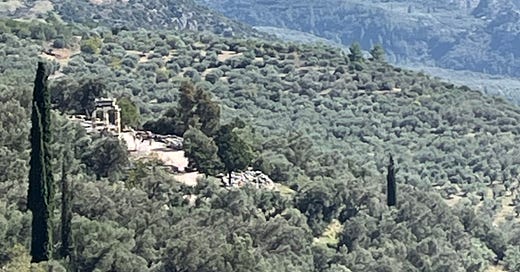
What about an oracle?
Quotes of the week
The Delphic Oracle said I was the wisest of all the Greeks. It is because that I alone, of all the Greeks, know that I know nothing.
Socrates
The Lord whose oracle is at Delphi neither reveals nor conceals, but gives a sign.
Heraclitus
We are living in the era of the busybody. In ancient Greece, if a person wanted guidance, it involved a long, arduous expensive journey to consult the oracle at Delphi. Today, if you want guidance, all you have to do is unplug your ears.
Margo Kaufman
Hello,
Was the world better when leaders could consult an Oracle? Would we need an oracle today, to try to make our world a better place? Maybe the distance to travel to an oracle, consider the advice given, would generate better decisions? Or maybe not? As with the prophecies; who knows?
Delphi
In October this year we visited Delphi, the place of the famous oracle. The Oracle is no more, only her reputation remains. Once you arrived, in the old days, you could read the inscriptions of a few maxims on a column at the entrance to the Temple of Apollo. The two most famous ones were: “Know thyself” (gnothi seauton) and “Nothing in excess” (meden agan).
“Know thyself” was earlier on interpreted to mean one should understand one’s limitations and know one’s place in the social scale. Through times it has been considered to also include knowledge of other people, of the universe, and/or of God. Along its self-reflexive sense, the maxim has been applied in different ways to problems of science, ethics and theology.
"Nothing too much" totally fits into the Swedish word “lagom”, meaning not too much, and not to little, just about right. In those days it was not understood to mean to limits one’s physical appetites. More like a reminder to avoid excessive emotion, particularly, excessive grief. It also worked as a warning against pride. As it was placed at the entrance to the temple, it might have meant that one should not exalt oneself even in piety; not to make lavish sacrifices to the gods, but give what one could spare. Probably indicating that anyone could give something.
The Oracle
You don’t have to be an expert on oracle prophecies to realise they were not always very clear. Since leaders in those days thought highly of themselves, they tended to interpret the advice in a positive way. That happened to Emperor Nero. He was 30 years old in 67 AD and had killed his mother in 59 AD. He was told by the Oracle:
“Your presence here outrages the god you seek. Go back, matricide! The number 73 marks the hour of your downfall!”
The prophecy did not go down well with Nero and he had the Pythia burned alive. He interpreted her prophecy that he would have a long reign and die at 73. It turned out his reign ended the year after, when a revolt by Galba was successful. Galba was 73 years old at the time. Nero committed suicide not long after, and Galba became emperor.
The Temple of Apollo
Visiting Delphi is like hearing the wings of history. Here the world’s greatest leaders came to ask advice from to the Oracle. Today the temple is destroyed, and no oracles are here to help world leaders today.
The temple and sanctuary at large are dedicated to Apollo, the god of archery, music, light, prophecy, the arts, and healing. The remnants of the temple you see today was built in the 4th century BC. This is where the famous Oracle, or Pythia, a high priestess, had her home. She made her prophecies under divine possession by Apollo. She was established in the 8th century BC, at the latest, though some estimates the shrine to be from 1400 BC. She was consulted until the late 4th century AD, and was among the most powerful women of the classical world. It is not clear how the prophecies were delivered or how the frenzied state in which she was giving them occurred.
Walking around, or more likely, up the stairs of the sanctuary which is rather big, you first meet the treasure buildings of different Greek cities, before you come up to a plateau, hosting the temple. Today, you cannot enter the ruins, although I seem to remember I could do that in the end of the 1980s when I was there. However, walking up the big stairs you walk the same stairs as the ancient people. Walking in the foot steps of Alexander the great. Just the thought.
There are different accounts of what happened when Alexander met the Oracle. This version is from Plutarch. When Alexander arrived in Delphi, in 336 BC, there was a period of “dark” days. During these days the oracle did not give any prophecies. Alexander dragged the priestess to the altar by force and demanded her to give her prophecy. She answered: “Invincible thou shall be, oh child!” Alexander was satisfied with the answer and let the priestess go. It seems it was not entirely safe to be a priestess. However, the prophecy turned out to be true in this case.
The sanctuary also hosts a theatre and a stadium as well as a lot of other buildings, used for this religious centre. Delphi is said to have been founded by Zeus. He released two eagles at opposite ends of the world, and where they met, Delphi, he determined should be the centre of the world. The Omphalos, a stone, marks the spot which the ancients considered to be the navel of the world.
Camping with a view
Not only is Delphi one of the most beautiful of the ancient sites, it also has a wonderful camping with a marvellous view. We enjoyed three nights here, lingering on the top of the world as it seems.
See you next week.













